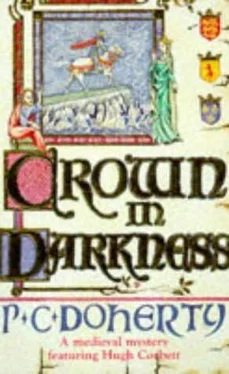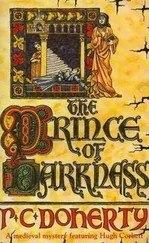Paul Doherty - Crown in Darkness
Здесь есть возможность читать онлайн «Paul Doherty - Crown in Darkness» весь текст электронной книги совершенно бесплатно (целиком полную версию без сокращений). В некоторых случаях можно слушать аудио, скачать через торрент в формате fb2 и присутствует краткое содержание. Жанр: Исторический детектив, на английском языке. Описание произведения, (предисловие) а так же отзывы посетителей доступны на портале библиотеки ЛибКат.
- Название:Crown in Darkness
- Автор:
- Жанр:
- Год:неизвестен
- ISBN:нет данных
- Рейтинг книги:4 / 5. Голосов: 1
-
Избранное:Добавить в избранное
- Отзывы:
-
Ваша оценка:
- 80
- 1
- 2
- 3
- 4
- 5
Crown in Darkness: краткое содержание, описание и аннотация
Предлагаем к чтению аннотацию, описание, краткое содержание или предисловие (зависит от того, что написал сам автор книги «Crown in Darkness»). Если вы не нашли необходимую информацию о книге — напишите в комментариях, мы постараемся отыскать её.
Crown in Darkness — читать онлайн бесплатно полную книгу (весь текст) целиком
Ниже представлен текст книги, разбитый по страницам. Система сохранения места последней прочитанной страницы, позволяет с удобством читать онлайн бесплатно книгу «Crown in Darkness», без необходимости каждый раз заново искать на чём Вы остановились. Поставьте закладку, и сможете в любой момент перейти на страницу, на которой закончили чтение.
Интервал:
Закладка:
An owl-hoot startled them all and a soldier cursed as the bird sailed low over their heads, plunging in the grass to seize some little creature which squirmed in its death agonies. 'Come!' said Selkirk impatiently. They walked a little further. Selkirk looked round and pointed to fresh-cut grass which surrounded a mound of newly-dug soil. 'Erceldoun's grave,' he remarked and after lighting a cresset-torch with a tinder flint ordered the soldiers to start digging. It was an easy task, the grave was shallow and soon they had scraped the dirt off the still-white coffin lid. 'Open it!' ordered Corbett but the soldier simply shook his head, threw his spade down and walked away. Corbett dug out his long Welsh dagger, knelt down beside the grave and prised open the lid. It scraped and creaked but eventually broke free. Corbett gagged at the bitter-sweet smell of corruption and covered his mouth and nose with his cloak to prevent himself choking. In the light of Selkirk's flickering torch the corpse lay face up, the head slightly askew, the eyes half-open. Putrefaction had set in around the nose and mouth, the skin felt cold and soggy as Corbett gently turned the head to look at the fatal weal round the neck, a broad, purple black gash with little round indentations which made it look like some ghostly parody of a necklace.
Corbett looked down at the fearful remains of a young man who, the last time they had met, had been a vigorous young soldier interested in clearing his own name. Now he was dead, brutally murdered, and Corbett knew his only crime was that someone had watched them talk. He wiped his hands on the wet grass beside the grave and ordered the reluctant soldier back to secure the lid of the coffin and cover it with soil. Corbett noticed that the escort was no longer round him. Ranulf was sitting yards away and the soldiers were crowded together muttering and cursing to each other whilst Selkirk had already moved across the cemetery to a nearby grave. 'If you have finished there,' Sir James called out softly. 'This is Seton's grave.' Again the soldiers scraped away the dirt and Corbett prised open the wooden lid. He rolled back the leather covering and heard Selkirk's gasp of surprise. The young man lying there was short of stature, blond, and though he had been in the ground much longer than Erceldoun the body, though swollen and green-tinged, had hardly begun to decompose. 'By the Hand of God!' Selkirk muttered. 'How has a body which has been in the ground remained so fresh?' 'I do not know,' answered Corbett. 'But I have my suspicions. I am not surprised. I almost expected to find it so.' Seton's body was quickly reinterred and, despite Sir James' protests, Corbett insisted that his escort accompany him back to the Abbey of Holy Rood. They returned without incident. Corbett curtly thanked Sir James, wished him goodnight and, followed by a relieved Ranulf, gratefully entered the cool darkness of the abbey buildings.
FIFTEEN
The following day Corbett was busy in the abbey scriptorium, seated at a small desk, writing out a list of facts, snorting with fury at his own mistakes which he would angrily cross out with a score of his pen and begin again. Ranulf came in with a series of plaintive questions but Corbett dismissed him with a look. The Prior, ever curious, also tried to intervene but Corbett, taciturn and withdrawn, made it plain he did not want to answer questions. Once this list was completed and each point neady itemised, Corbett picked it up, left the sweet, fragrant-smelling library to walk slowly round the cloisters, muttering to himself, referring now and again to the piece of parchment held tightly in his hand, like some preacher learning his words, or a student preparing to discuss his treatise. The monks, unused to such curious behaviour, gossiped with relish about the strange eccentricities of this English clerk. Corbett did not mind; he broke off his constant walking for a meal of fish broiled in milk and herbs, then returned to his task. The images so vague in his mind were now quite clear and distinct but he had to be certain: the solution must be presented like a concise clear legal document, everything in its right place and, unfortunately, there were still gaps to be filled and ragged ends tidied up.
Late in the afternoon, he asked and obtained from the now bemused Prior the services of the lay brother who had accompanied them to Earlston. Ranulf was ordered to saddle the horses and Corbett led his little party from the abbey and up into the town. He was pleased to see that as soon as they left the abbey gate, they were joined by the soldiers Sir James Selkirk had stationed near the abbey. Corbett was oblivious to everything else as he travelled down into the city: the dirty streets, the noisy clamour of the traders, even the mixture of rich smells from bakeries, cookshops and heaps of human and animal ordure steaming in the summer sun. He was trying to remember the route he had taken the morning de Craon's men had stopped him. The heat in the narrow packed streets was stifling and Sir James' men began to complain loudly; the lay brother, used to Corbett's strange ways, slumped resignedly on his gentle cob whilst Ranulf looked askance at his erratic and peculiar master.
At last, Corbett found the narrow alleyway and pushed his horse through the crowd to the battered ale-stake above the dingy house. Ranulf and the escort were told to wait outside but the lay brother was asked to come in for he could, as Corbett put it, "talk in the common language". Ranulf, outside, peered through the small window, its shabby wooden shutters flung wide to let in the air and light. The place was just like any ale-house or tavern in Southwark with its dirt-beaten floor and ramshackle tables, filled with traders and peasants eager to spend the profits of market day. Ranulf watched Corbett, the lay brother acting as interpreter, in deep conversation with the tavern-keeper. After a while, Corbett nodded, handed over a few coins and left, his face wreathed in a complacent smile.
They made their way back, not to the abbey but the castle, Corbett sending ahead one of his escort to ask Wishart for an audience and when they arrived the old, foxy-faced Bishop was waiting for them in his now sweltering chambers, though still swathed in fur-trimmed robes. 'The blood thins, Master Clerk,' he apologised. 'I go to meet my death. One day, perhaps sooner than you think, you might meet yours!' Corbett ignored the hidden threat and relaxed in the chair the servant had brought him. Apart from Selkirk, they were alone, for Corbett had left Ranulf and the escort to relax and refresh themselves.
'You wanted to see me, Master Clerk, so come to the point!' Corbett sensed the Bishop was tense, anxious, even frightened. 'My Lord,' he said. 'Did the late King ever discuss his marriage with you?' 'No,' the Bishop was emphatic. 'His Highness was, er, loath to discuss such matters with me.' 'With anyone then?' 'Not to my knowledge. The King kept personal matters to himself.' 'Were the French envoys an exception, particularly in the days preceding his death?' Corbett persisted with his questioning. 'Yes,' the Bishop replied slowly, trying to create time to think. 'But this is not an English trial, Master Corbett. So, why the pert questions? Am I before a court?' 'My Lord,' Corbett genuinely apologised. 'I did not intend to give offence but I can see an end to this matter. I will inform you of it but I am impatient.' Corbett paused before continuing. 'Well, were the French envoys privy to the King's secrets?' The Bishop picked up a long thin parchment-knife and balanced it in a vein-streaked, brown-spotted hand. 'Alexander was a good king,' he replied cautiously. 'He kept Scotland peaceful, but, as a man, he was ruled by his codpiece. When his children died, he dallied, did not enter into a marriage contract but then agreed to marry the Princess Yolande. At first, matters went well. The kingdom hoped for an heir but the King became surly, angry and withdrawn; he shunned the French envoys but, yes, in the days preceding, even the day before his death, he was closeted with them.'
Читать дальшеИнтервал:
Закладка:
Похожие книги на «Crown in Darkness»
Представляем Вашему вниманию похожие книги на «Crown in Darkness» списком для выбора. Мы отобрали схожую по названию и смыслу литературу в надежде предоставить читателям больше вариантов отыскать новые, интересные, ещё непрочитанные произведения.
Обсуждение, отзывы о книге «Crown in Darkness» и просто собственные мнения читателей. Оставьте ваши комментарии, напишите, что Вы думаете о произведении, его смысле или главных героях. Укажите что конкретно понравилось, а что нет, и почему Вы так считаете.












